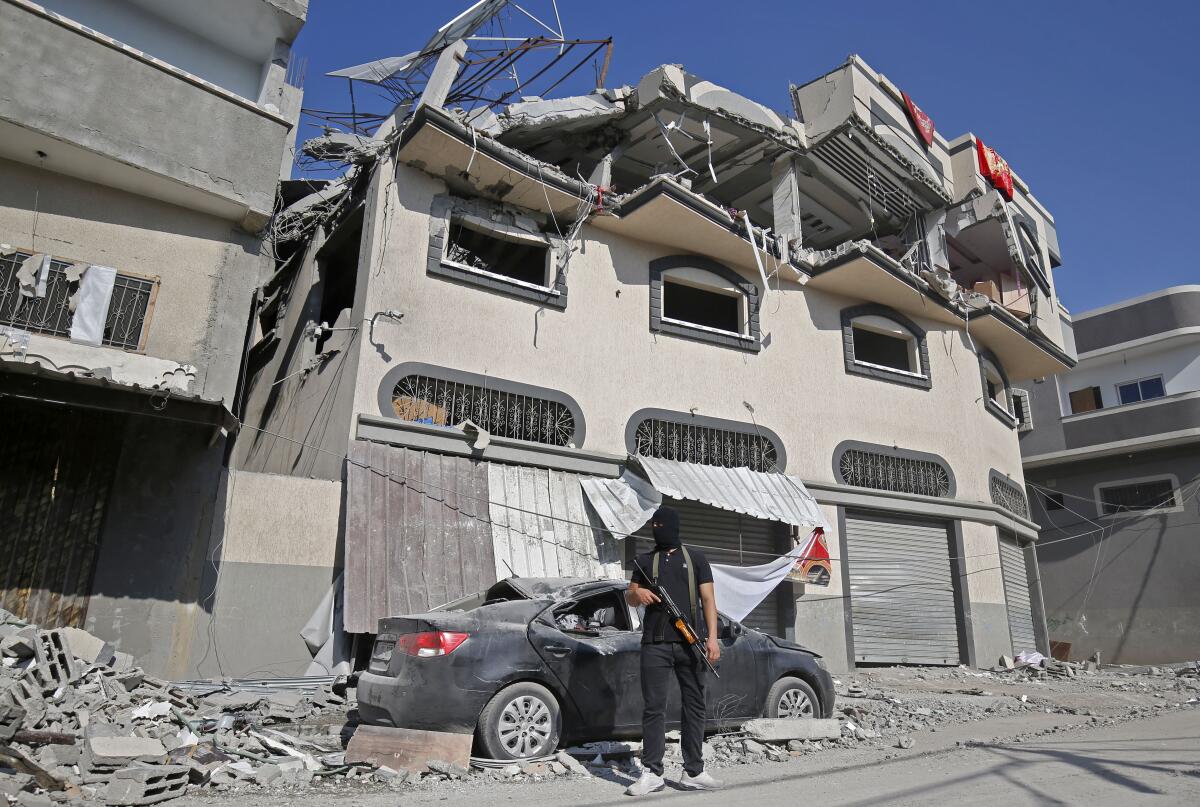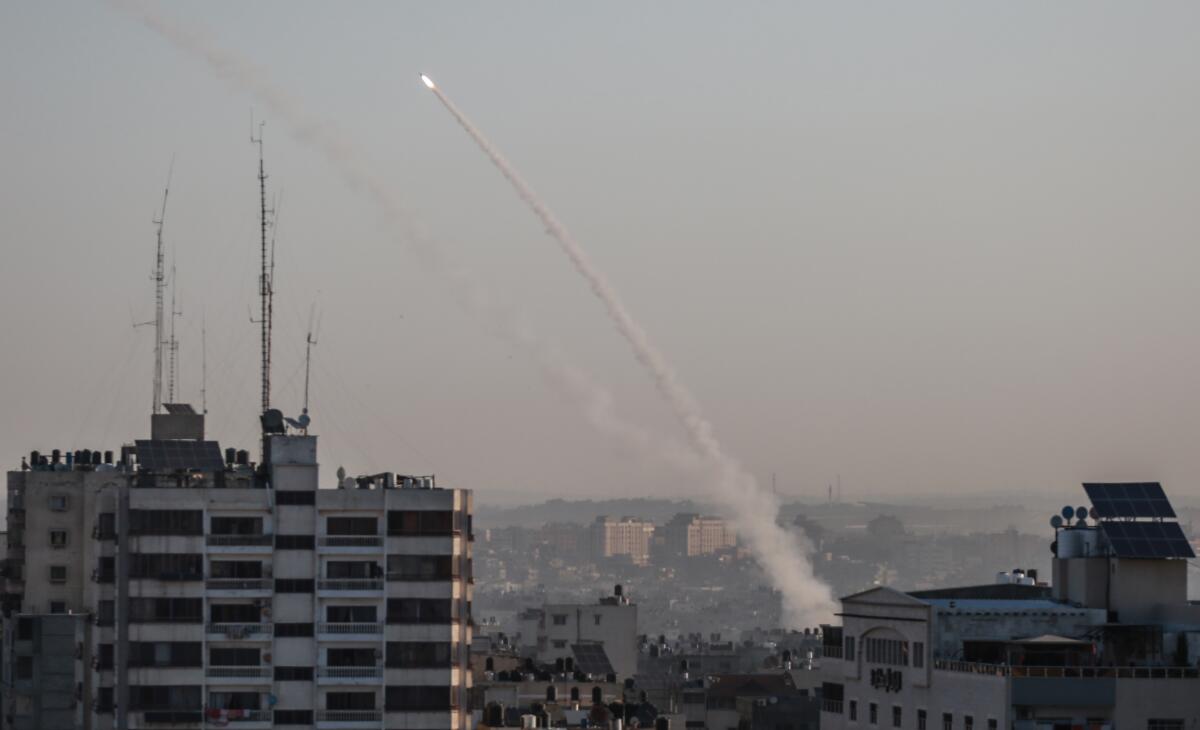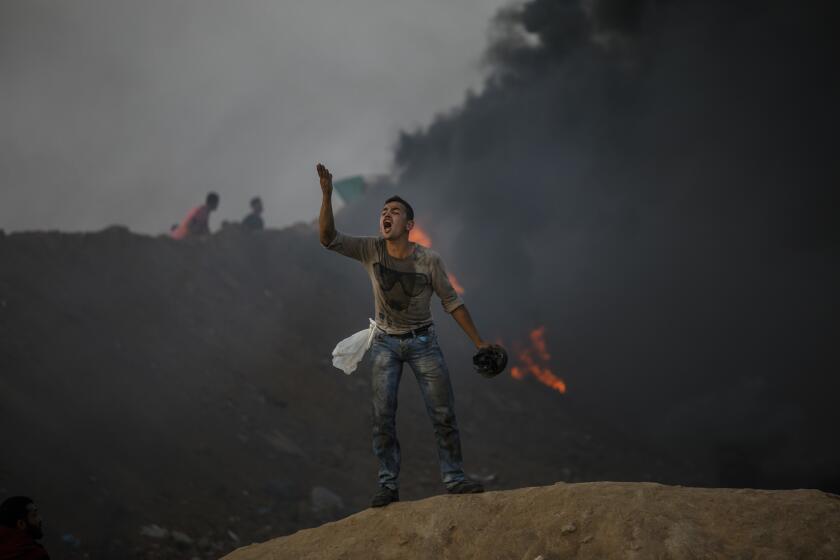Israel’s targeted killing of a Palestinian leader sends a chilling message to Hamas

JERUSALEM — For years, the group known as the Palestinian Islamic Jihad, the second most powerful faction in the blockaded Gaza Strip, has sought to play a leading role in Palestinian affairs, often jousting with Hamas, the armed militia that has ruled the enclave for almost 12 years.
In Israel and the West, both entities are widely considered terrorist groups. In the contest between the two, Hamas’ expanded responsibilities include the management of daily life in Gaza, whereas Islamic Jihad remains stuck in the secondary role of a paramilitary group threatening and aggravating Israel and Egypt, among others.
From the Israeli perspective, “it is not that Hamas is any better,” said Amos Gilead, executive director of the Institute for Policy and Strategy at the Interdisciplinary Center in Herzliya. “But because it has responsibility for the Gazan population, at least you can predict its actions. With Islamic Jihad, well, there’s just nothing to do.”
On Tuesday, Israel went after the group, with Prime Minister Benjamin Netanyahu announcing that the Israeli air force had killed “arch-terrorist” Bahaa abu Atta, 42, the Palestinian Islamic Jihad commander, in a daybreak surgical strike in which his wife, Asma, also died. Islamic Jihad retaliated with nearly 200 missiles fired into Israel, which struck back with air sorties that left eight people dead in Gaza, authorities there said. No Israelis were reported killed in the daylong combat.
Israel holds Abu Atta responsible for hundreds of missile launches into its territory, including a particularly audacious move on Sept. 10, in which the southern city of Ashdod was pelted with rockets at the very moment Netanyahu addressed an audience of his party faithful at a campaign event a week before elections.

Netanyahu’s remarks, streamed live on his Facebook page, were interrupted by the piercing wail of air raid sirens and the sight of his bodyguards leaping onstage and whisking him to safety in front of stunned spectators.
But for all of Netanyahu’s apparent pride Tuesday in the successful operation, it once again proved to Israelis and Palestinians how delicate the status quo is.
Tuesday turned into a day of almost-war, with Islamic Jihad rockets reaching as far north as Tel Aviv, Israel’s economic nerve center, and paralyzing much of the country. Islamic Jihad receives most of its support from Iran.
Homes and at least one factory were demolished by direct strikes, but the lack of fatalities on the Israeli side testified to the success of the Iron Dome antimissile system, the country’s extensive network of civil defense installations, and a population trained in following the instructions of the army’s Home Front Command.
In Tel Aviv and surrounding cities, and in the entire south of Israel, children were kept home from school and many businesses were shuttered. The barrage continued into the evening but quieted after midnight.
The Palestinian Authority, which has a contentious relationship with both Hamas and Islamic Jihad, appeared largely unmoved, although chief negotiator Saeb Erekat condemned Israel’s act as a “crime.” Both Hamas and Islamic Jihad issued statements condemning the assassination of Abu Atta and threatening continued retaliation.
Fathi Sabbah, a Gazan writer and political analyst, said in an interview that “Hamas will think a thousand times before entering a long confrontation with Israel.” He added: “Hamas appears to be suffering from complete loss of control, giving Abu Atta the space to launch attacks on Israel without coordination.”
The response from Israel has been harsh: at least 115 Palestinians killed and thousands more injured in eight weeks of protests along the Gaza Strip’s eastern border.
A stalemate reigns on all sides, between Israelis and Palestinians and within each population.
Netanyahu has led a caretaker government for almost a year and has failed, after two rough electoral campaigns, to form a new government.
On Tuesday, calling the Gaza violence crazy, President Trump appeared perplexed but amused at Netanyahu’s predicament.
At a New York fundraiser for Orthodox Jews, he wondered: “What kind of a system is it over there? They are all fighting and fighting…. They keep having elections and nobody is elected.”
The uptick in violence and disruption of civilian life came at a precarious time for Netanyahu, who is expected to be indicted on several counts of corruption, including bribery, fraud and breach of trust, before the end of the year.
Former army chief Benny Gantz, the center-left leader who barely bested Netanyahu in the September vote while failing to win a parliamentary majority, has a week left in his mandate to form a new government before the entire morass is thrown to the Knesset, Israel’s parliament, which is itself deadlocked. The unending cycle could continue into third successive elections.
Netanyahu spent much of the day before Abu Atta’s killing darkly warning Israelis against Gantz’s possible coalition with left-of-center parties. “A minority government supported by the Arab parties is a slap to the face of [Israeli] soldiers and a danger to the state of Israel,” he said.
Arab citizens account for 20% of the Israeli population. Palestinians living in the West Bank and Gaza are not Israeli citizens.
Although army officials insisted that the timing of the Abu Atta operation was strictly a matter of opportunity — knowing he was a target, he usually surrounded himself with women and children — Netanyahu did not shy away from taking full credit as having guaranteed the nation’s security.
Special correspondents Tarnopolsky and Abu Alouf reported from Jerusalem and Gaza City, respectively.
More to Read
Sign up for Essential California
The most important California stories and recommendations in your inbox every morning.
You may occasionally receive promotional content from the Los Angeles Times.











